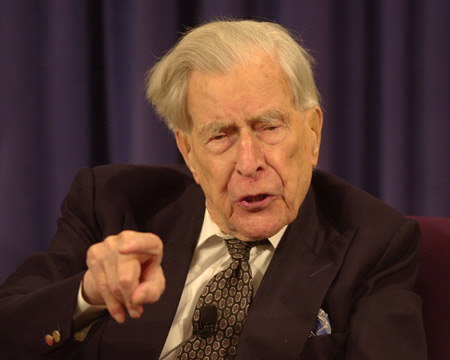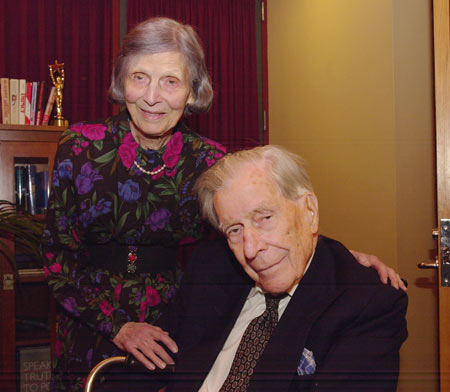Galbraith: A life of service
ARCO Forum hosts ‘The World According to Galbraith’

The slides that flashed across the screen as the audience crowded into the ARCO Forum easily proved the assertion that Richard Parker made minutes later in his introductory remarks: Here was a man who was not merely a celebrity, but rather embodied that rarer quality, fame.
The slides showed John Kenneth Galbraith, the Paul M. Warburg Professor of Economics Emeritus, with a succession of friends, colleagues, and protegees, among them Harry Truman, Eleanor Roosevelt, Lyndon Johnson, George McGovern, Walter Mondale, Jimmy Carter, Jawaharlal Nehru, Gloria Steinem, Barbra Streisand, Julia Child, and a flock of Kennedys.
The 93-year-old economist had come to the Forum to participate in a program titled “The World According to Galbraith.” Parker, a senior fellow at the Joan Shorenstein Center on the Press, Politics & Public Policy, was there to introduce Galbraith and to elicit his opinions and reminiscences.
Parker is the author of “John Kenneth Galbraith: The Making of American Economics,” which will be published in early 2003 by Farrar, Straus & Giroux. The book, an intellectual biography that places Galbraith’s career against the background of 20th century history, politics, and American economic thought, is based on more than 200 hours of discussions with Galbraith and “hundreds of linear feet” of boxed papers, stored at the Kennedy Library and in Galbraith’s basement.
Galbraith’s government service began in the early 1940s when he worked in Franklin Roosevelt’s administration in charge of wartime price controls. Responding to Parker’s request for recollections of those years, Galbraith said Franklin and Eleanor Roosevelt “have always been the largest political figures in my life and in the life of my generation.”
He called Eleanor “one of my best-loved friends” and “more of a liberal than FDR,” adding that “when there was something with a high level of urgency, we always went to Eleanor, not FDR, because, one, we had a more sympathetic audience, and, two, we could always get an appointment.”
He said that Franklin and Eleanor looked at the United States as an extension of their estate in Hyde Park. “They felt responsible for everything on the estate. It was always a human concern, not ideological.”
Galbraith described John F. Kennedy, under whom he served as ambassador to India, as “intelligent, attractive, but not given to an excessive amount of work. He had that elegant detachment from labor.”
A close friend of the Kennedys, Galbraith was able to communicate directly with the president while he was stationed in India, a privilege the State Department did not appreciate. The State Department requested that Galbraith be instructed to send his communications through departmental channels, whereupon Kennedy wired Galbraith to ask him what he thought about such an arrangement.
“I told him that communicating through the State Department was like trying to have sexual intercourse through the blanket.”
Galbraith said that he admired Lyndon Johnson and considered him in some ways “the most misunderstood man we’ve ever had in the White House.” He said that Johnson’s commitment to the poor and his achievements in promoting civil rights “were plastered over” by his support of the Vietnam War.
On the subject of that unpopular war, Galbraith recalled an incident during the chaotic Democratic National Convention in Chicago in 1968. At one point, Galbraith mounted a platform to plead with a group of protesters not to engage in violence against the National Guardsmen who were stationed in front of the convention site.
“Just remember, they’re draft dodgers just like you are,” he told the crowd.
Galbraith instantly regretted the quip, and when a National Guard officer called him over, he was afraid he would receive a dressing down. Instead the officer told him that the remark was the best thing that had been said about them all day.
“That’s when I knew the war was coming to an end,” Galbraith said.
Galbraith had less to say about the Republican Presidents Richard Nixon and Ronald Reagan. He remarked that Nixon “caused me the worst weekend I ever had in my life.” Galbraith was at his house in Vermont when Nixon’s “enemies list” became public. “People were calling me all weekend long asking, ‘How the hell did you get on that list and I didn’t?’”
Galbraith said that he and Reagan were both founders of Americans for Democratic Action in the days before Reagan switched from the Democratic to the Republican Party. Reagan had collected contributions from supporters in Hollywood and sent the funds to Galbraith.
“Nothing smoothes a relationship as much as a check,” Galbraith said.
Asked about his role in the brief border war between China and India that occurred at the same time as the Cuban Missile Crisis, Galbraith said he remembered being awakened early one morning by news that the Chinese had offered a cease-fire. He immediately went to Indian Prime Minister Nehru and urged him to accept, reminding him that “The conflict was over real estate you could only hope would belong to someone else.”
Asked what liberalism meant to him, Galbraith replied that he did not believe in categories.
“In many matters, you want to exempt yourself from doctrine and apply yourself to the individual case. The well-being of the people should be the controlling factor.”
Share this article





